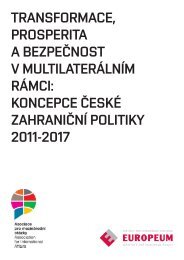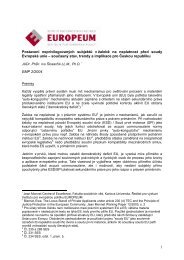eu constitutionalisation - EUROPEUM Institute for European Policy
eu constitutionalisation - EUROPEUM Institute for European Policy
eu constitutionalisation - EUROPEUM Institute for European Policy
Create successful ePaper yourself
Turn your PDF publications into a flip-book with our unique Google optimized e-Paper software.
SUMMARYChapter 3: The 2004 IGC: Bargaining or Learning?The aim of this paper is to identify key hypotheses about the 2004 DublinIGC from the perspective of bargaining and learning theories. The paper isdivided into four parts: an overview of bargaining theory is provided andhypotheses drawn from this overview. Second, the relevance of learningin analysing the 2004 Irish presidency of the EU is examined. Finally therelevance of the hypotheses drawn is summarised. The following hypothesesare drawn:1) The 2004 IGC reflected a bargaining process which allowed small statesto achieve their strongest preference.2) The 2004 IGC provides evidence of joint-problem solving and conceptualisation:non-zero sum process.3) The 2004 IGC bargaining process reflected the interests and control ofthe more powerful states, not the influence of the EU presidency or otherEU institution.1. BARGAINING THEORYBargaining in the general literature refers to a process whereby agreementis reached by a group of actors, each of which have their own sets of preferences.Bargaining itself is thus a relatively n<strong>eu</strong>tral term; it neither indicatesthe existence of a zero-sum game, whereby <strong>for</strong> one actor to gain anothermust concede a preference, or a non-zero sum game whereby by all actorscan achieve their preferences by agreeing to one outcome. In game theoreticalliterature much ef<strong>for</strong>t has been made to examine whether the ’game’ iszero-sum or non-zero sum. Moreover, a primary aim is to identify whethera bargaining process exists at all or whether one actor or group of actorscoerce others to reach agreement. In this sense while bargaining is n<strong>eu</strong>tralabout whether preferences are shared or not, it precludes the existenceof coercion. In the next section an overview of bargaining from a rationalinstitutionalist perspective is provided be<strong>for</strong>e examining alternative viewswhich imply bargaining refers only to a specific style of negotiation.Bargaining in Rational InstitutionalismInstitutionalism emphasises the role of institutions in advancing co-operativebargaining between states. Co-operation is defined as ‘actions ofseparate individuals or organizations – which are not in pre-existentharmony…brought into con<strong>for</strong>mity with one another through a processof negotiation’.¹ Order is defined by the absence of <strong>for</strong>ce, the lack ofhierarchy among issues and the presence of multiple channels of contactbetween societies’The rational institutionalist task in international relations is to explain howco-operative bargaining relations emerge between states. According toinstitutionalists complex relations are pursued within sets of stable organisationsbecause of institutionalisation.² International regimes facilitateco-operative bargaining between states, where a regime is defined as a setof norms, rules and standard operating procedures which underpin behaviour.³There are two main ways in which the regime facilitates co-operation:(i) It influences the bargaining relationship between states and (ii)It provides in<strong>for</strong>mation and causes a process of learning which facilitatesco-operation. In a regime, if one actor fails to co-operate, then other actorsmay fail to co-operate on other issues in the future.In the complex interdependent world, issue linkage occurs betweenrational actors. Each actor has different goals depending on the issue area.However, if one actor fails to compromise and reach agreement on onepolicy issue (that is, fails to co-operate with another actor), then otheractors may fail to co-operate with it and reach agreement on other issues inthe future. In other words, the ‘shadow of the future’ provides incentives<strong>for</strong> actors to co-operate with each other and compromise so that they willeach be more assured of achieving their policy priorities at a future date.⁴Furthermore, where different issues are linked closely (a ‘dense policyspace’⁵, regimes ‘will reduce the cost of continually taking into account theeffect of one set of agreements on others’.⁶ Thus the denser the policy space,1) KEOHANE and NYE (1977), p. 1822) RUGGIE (1998), p. 543) KEOHANE and NYE, op. cit.4) AXELROD (1990), p. 1745) KEOHANE (1984), p. 796) Ibid.Chapter 3: The 2004 IGC: Bargaining or Learning?76 77








